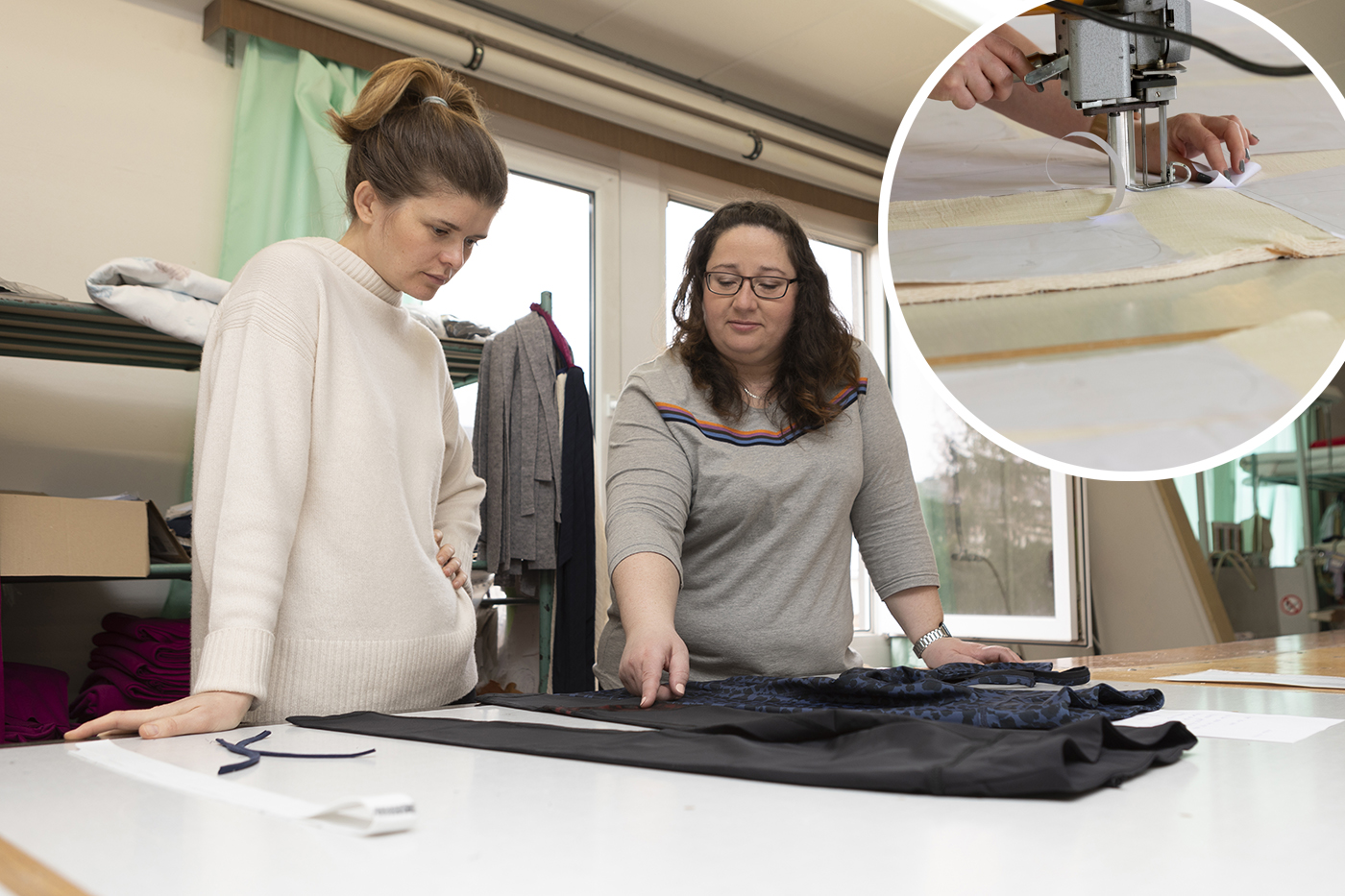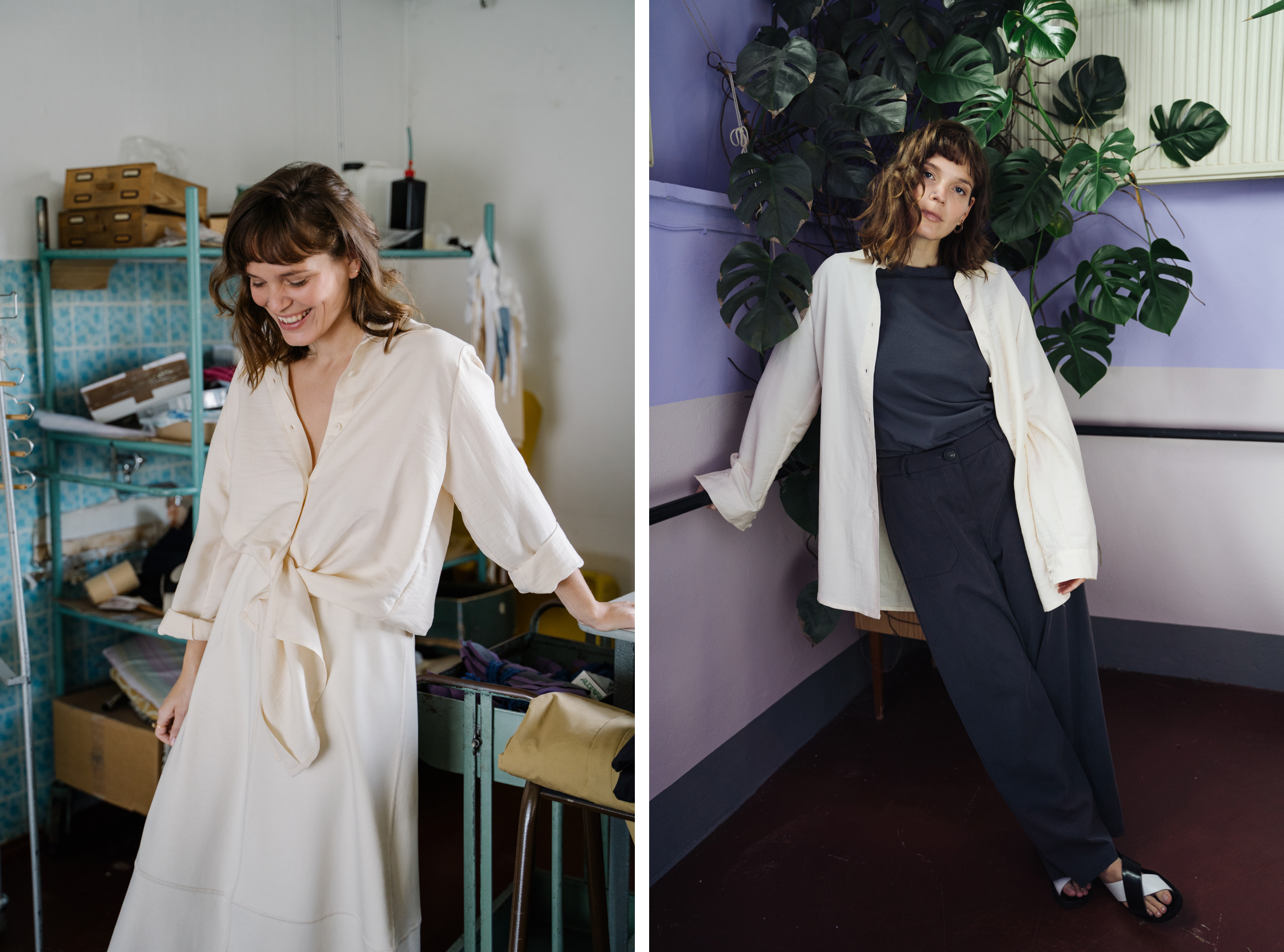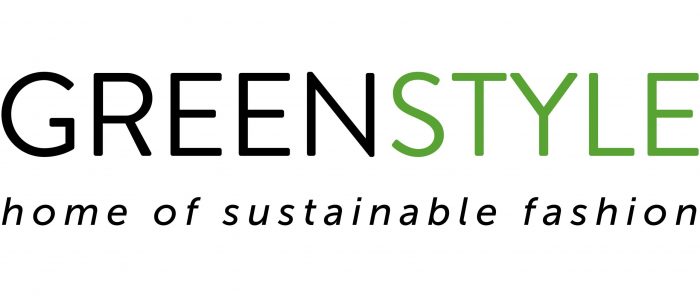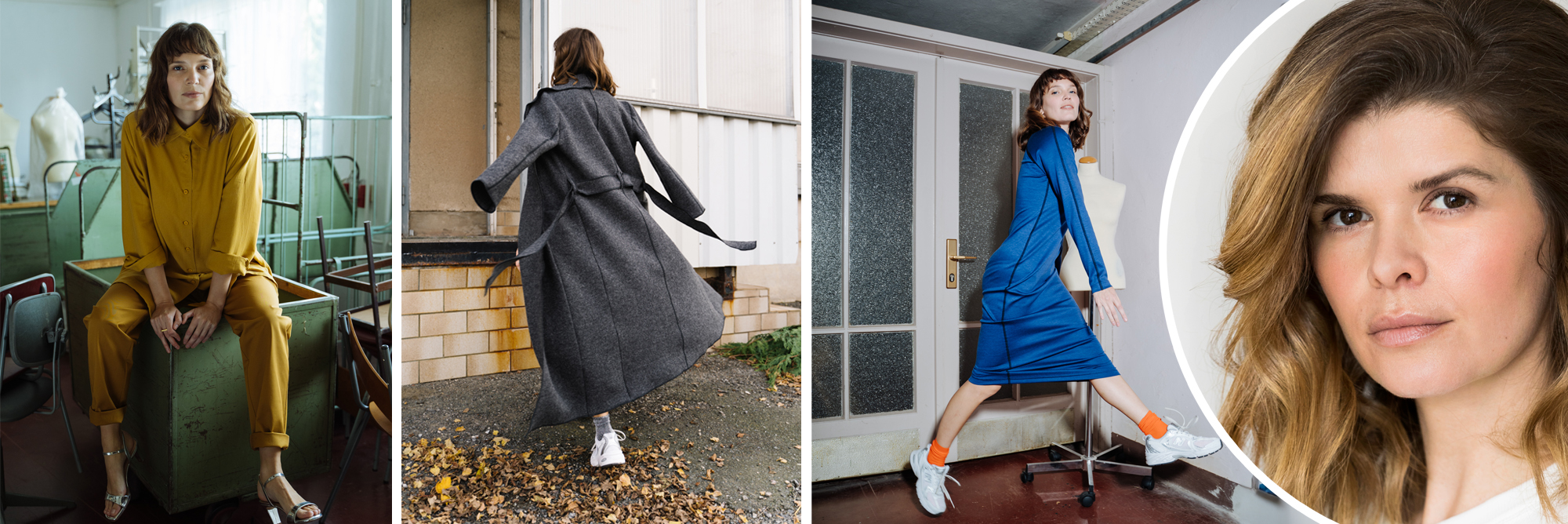Maria Seifert is a fashion designer. Since 2010, the Leipzig native has been designing timelessly beautiful and super-feminine capsule collections from certified fabrics or leftovers. In each case influenced by ecological and social regulations. First in Berlin. Since 2014 back in her home town. Short delivery and communication channels included: because Maria Seifert Collections was and is manufactured in the Erzgebirge. 135 km from Leipzig. Personal contact with the seven seamstresses and the pattern maker was a matter of course for Maria.
And then the factory was up for sale. It was going to be closed. The seamstresses were going to be laid off. Promoting women and preserving the textile trade in Germany play a central role for Maria Seifert. Anyone who knows Maria can guess what happened next: Long story short: Maria bought the company, saved the jobs, made production even fairer and made it possible with the production facility in the Erzgebirge. Really Made in Germany. That was in 2019.
Textile sewing and contract manufacturing company with tradition from Eibenstock in the Erzgebirge.

The Textilmanufaktur Seifert has landed (inter)national orders. Everything was slowly starting to go well. Then the pandemic came. Production was still largely at full capacity. The problem came later. Companies are cutting costs everywhere. Production across the border is cheaper after all. Now some of the seamstresses in the Textilmanufaktur are on short-time work. If things continue like this, jobs are at risk. The loans cannot be paid. That cannot be allowed to happen.
Local and transparent production of sustainable fashion and textiles at fairly calculated prices.
Because: The textile factory in the Erzgebirge produces sustainably and transparently. With fair and low-CO2 production. With individual and excellent advice. With a good feeling. And with fantastic results. Here, every euro is invested wisely.
Made in Germany doesn’t work? It does! In the Erzgebirge. At Maria Seifert.
And that’s why I keep recommending Maria and her team and am happy to see that, among others, the sustainable brand Chlench from Stuttgart has arrived in the Erzgebirge and – no surprise – is incredibly happy about this opportunity and the collaboration.

A conversation with Maria Seifert about the current situation in her Textilmanufaktur:
Mirjam: Maria, we have known each other for a long time and I really appreciate your work and your commitment. You took such a big and brave step when you took over the factory. Would you please take us behind the scenes of your business and into your situation?
Maria Seifert: We started the business activities of Textilmanufaktur Seifert UG (limited liability) very well in 2020. In mid-2020, I had already tackled and transformed my big dream. This means: We sew almost exclusively for sustainable brands. Even when the pandemic started in 2020, everything continued at full speed. At the same time, I quickly realized that we could not maintain the previous production prices. I had to turn everything upside down here too, because it had not been treated carefully before my time.
Due to the necessary increase in production prices, we have lost customers who prefer to go abroad and accept that people are low paid.
We fought hard in 2021 and 2022, but got through it well. In December 2023, a week before Christmas, with the hope that we would be able to end the year well for once, the economic crisis hit. In the autumn, our main customer had already dropped out for economic reasons and now everyone had to budget. We were unable to build up many reserves because we are also constantly negotiating prices.
Mirjam: Why are you constantly negotiating prices? And why haven’t you been able to build up reserves despite a good order situation?
Maria Seifert: We are miles away from being given credit for being able to calculate well and build up reserves. The focus is usually on the brands’ profits, not ours. At this point I would like to highlight the small brands that never renegotiate, or larger brands like CONSCHES from Austria. Lanue et Lenu from Switzerland have also decided not to negotiate and are working on their own direction. They stand behind our prices and tend to adjust their own calculations. With Oktopulli we have a completely different kind of support because the brand itself follows a completely different approach. I am very hard-working and have placed our offer with many German brands, including large ones. Unfortunately without success.
I approached many well-known sustainable and conventional brands. Without success.
Mirjam: Why is your Made in Germany offer not being more widely accepted?
Maria Seifert: Firstly, it is the price, then the internal logistics/distribution/purchasing. Secondly, the lack of desire for support and encouragement, combined with the high profit margins that companies all too often do not want to do without. Agreed appointments are not kept and are not cancelled either.
As an entrepreneur, you don’t have the freedom to express your own opinion. This makes you vulnerable and attracts negative attention. Nevertheless, I would like to give you some insight.

Mirjam: What would help you best now?
Maria Seifert: That we continue to be recommended so highly, as you, Kay Alexander Plonka and many others have. That customers who produce at the Textilmanufaktur continue to do so and appreciate my structured and professional approach. Accept it gratefully and allow themselves to be guided through processes. It is really important to keep reminding yourself how hard textile producers fight and how much we do for manufacturing in Germany.
I did not buy a well-run company as a successor, but have been transforming the content of a textile production company since 2020 without ever having time to work with a network.
Very important: We need a larger customer again who can stabilize the normal frequency within production. I could have hired three capable employees last year. I couldn’t. Instead, we can be really grateful for every person who is currently only working as a seamstress for the minimum wage. But that is definitely not our goal.
We also urgently need help with the distribution of the Maria Seifert brand. We have a great summer collection 2025 in development that we would like to bring out. For this we need a good sales agency that believes in us and builds us up. We have a fantastic DNA and a good own brand.
Building up the Maria Seifert brand would give us financial stability and independence. And I could pay my employees more than minimum wage.
Textile production can only be saved by respecting each other and reflecting on ourselves as sustainable customers.
If we want to change something, we can only do it together, and we as producers must also be heard sufficiently.
My dream is to work with our great brands to find a trade fair operator who can offer us a cost-effective platform to showcase MADE IN GERMANY.

Mirjam: For the benefit of all those reading the interview: What exactly do you offer?
Maria Seifert: Actually, everything. I would rather mention what we can’t do: we don’t work with very thick fabrics and we can’t sew underwires into underwire bras. Otherwise, we do a lot: from highly elastic to firm fabrics, swimwear, underwear, urban casual sportswear, women’s wear, Kiko, men’s wear, home & living. We have a lot of experience in all areas.
Mirjam: Who is your production facility suitable for – and who is it perhaps not suitable for? Keywords: production quantities, etc.
Maria Seifert: Thank you for the nice question! I’ve never been asked this before. We produce from one piece, but 1-5 pieces are sample quantities with corresponding surcharges. We ask for a minimum quantity of 25 pieces per part. We’re happy to split them into two colors. We’re open to the upper limit. Delivery times have to be discussed separately. For larger quantities, we work with interim deliveries. We’re interested in sustainable brands and in really long-term cooperation, so that I can bring in skilled workers.
You’ve come to the right place if you want to support a women-only company that handles high volumes and has a humorous managing director who defends her company like a lioness and places great value on mutual respect and benevolent cooperation.
Mirjam: And when will we see something from your own fashion brand again?
Maria Seifert: If I can afford it financially, from summer 2025. The collection is ready, as I said we need support and the financial means to be able to bring it out. It really turned out beautifully. I’m very proud of it!



